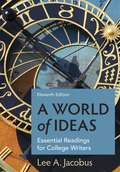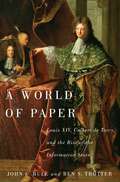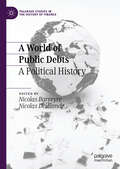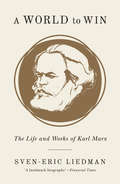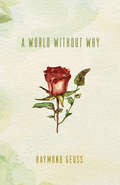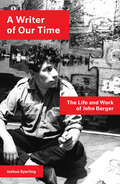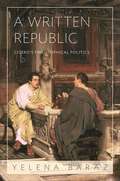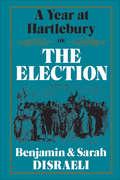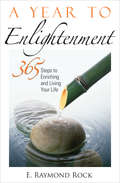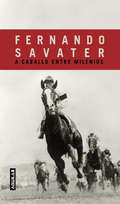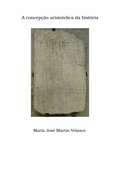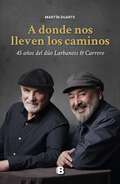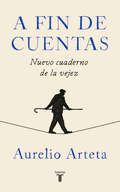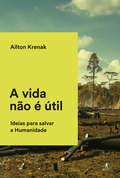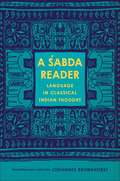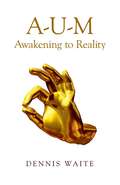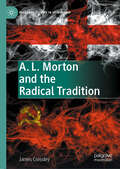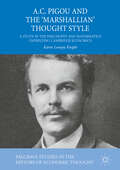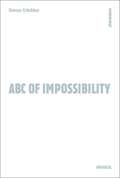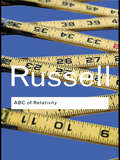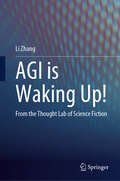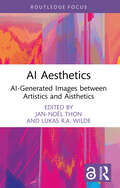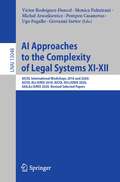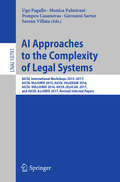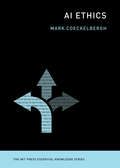- Table View
- List View
A World of Ideas: Essential Readings for College Writers
by Lee A. JacobusThe book engages students with the big ideas that have shaped society and are reshaping it today. Readings by essential authors -help students trace the origins of central cultural concepts and respond to them. A World of Ideas asks such crucial questions as, What defines good government? What forces shape our society? What does it mean to be educated? The text helps students respond to these questions by providing the guidance they need to understand, analyze, and write. Substantial, supportive apparatus helps students focus on both the content of the readings as well as the rhetorical moves that writers use to achieve their purposes, providing instruction and models as students join in the important conversations continuing today. New chapters on Education and Gender, and new readings throughout, speak to today's urgent concerns. Improved writing instruction includes more scaffolding and examples that provide greater support for students.
A World of Paper: Louis XIV, Colbert de Torcy, and the Rise of the Information State
by John Rule Ben TrotterHow the administrative personnel in Louis XIV's foreign office developed innovative structures and procedures for managing the flow of information.
A World of Public Debts: A Political History (Palgrave Studies in the History of Finance)
by Nicolas Barreyre Nicolas DelalandeThis book analyzes public debt from a political, historical, and global perspective. It demonstrates that public debt has been a defining feature in the construction of modern states, a main driver in the history of capitalism, and a potent geopolitical force. From revolutionary crisis to empire and the rise and fall of a post-war world order, the problem of debt has never been the sole purview of closed economic circles. This book offers a key to understanding the centrality of public debt today by revealing that political problems of public debt have and will continue to need a political response. Today’s tendency to consider public debt as a source of fragility or economic inefficiency misses the fact that, since the eighteenth century, public debts and capital markets have on many occasions been used by states to enforce their sovereignty and build their institutions, especially in times of war. It is nonetheless striking to observe that certain solutions that were used in the past to smooth out public debt crises (inflation, default, cancellation, or capital controls) were left out of the political framing of the recent crisis, therefore revealing how the balance of power between bondholders, taxpayers, pensioners, and wage-earners has evolved over the past 40 years. Today, as the Covid-19 pandemic opens up a dramatic new crisis, reconnecting the history of capitalism and that of democracy seems one of the most urgent intellectual and political tasks of our time. This global political history of public debt is a contribution to this debate and will be of interest to financial, economic, and political historians and researchers. Chapters 13 and 19 are available open access under a Creative Commons Attribution 4.0 International License via link.springer.com.
A World to Win: The Life and Thought of Karl Marx
by Sven-Eric Liedman Jeffrey N. SkinnerEpic new biography of Karl Marx for the 200th anniversary of his birthIn this essential new biography—the first to give equal weight to both the work and life of Karl Marx—Sven-Eric Liedman expertly navigates the imposing, complex personality of his subject through the turbulent passages of global history. A World to Win follows Marx through childhood and student days, a difficult and sometimes tragic family life, his far-sighted journalism, and his enduring friendship and intellectual partnership with Friedrich Engels.Building on the work of previous biographers, Liedman employs a commanding knowledge of the nineteenth century to create a definitive portrait of Marx and his vast contribution to the way the world understands itself. He shines a light on Marx’s influences, explains his political and intellectual interventions, and builds on the legacy of his thought. Liedman shows how Marx’s masterpiece, Capital, illuminates the essential logic of a system that drives dizzying wealth, grinding poverty, and awesome technological innovation to this day.Compulsively readable and meticulously researched, A World to Win demonstrates that, two centuries after Marx’s birth, his work remains the bedrock for any true understanding of our political and economic condition.
A World without Why
by Raymond GeussWhy the human and natural world is not as intelligible to us as we think it isWishful thinking is a deeply ingrained human trait that has had a long-term distorting effect on ethical thinking. Many influential ethical views depend on the optimistic assumption that, despite appearances to the contrary, the human and natural world in which we live could, eventually, be made to make sense to us. In A World without Why, Raymond Geuss challenges this assumption.The essays in this collection—several of which are published here for the first time—explore the genesis and historical development of this optimistic configuration in ethical thought and the ways in which it has shown itself to be unfounded and misguided. Discussions of Greco-Roman antiquity and of the philosophies of Socrates, Plato, Hegel, Marx, Nietzsche, and Adorno play a central role in many of these essays. Geuss also ranges over such topics as the concepts of intelligibility, authority, democracy, and criticism; the role of lying in politics; architecture; the place of theology in ethics; tragedy and comedy; and the struggle between realism and our search for meaning.Characterized by Geuss's wide-ranging interests in literature, philosophy, and history, and by his political commitment and trenchant style, A World without Why raises fundamental questions about the viability not just of specific ethical concepts and theses, but of our most basic assumptions about what ethics could and must be.
A Writer of Our Time: The Life and Work of John Berger
by Joshua SperlingThe first intellectual biography of the life and work of John BergerJohn Berger was one of the most influential thinkers and writers of postwar Europe. As a novelist, he won the Booker prize in 1972, donating half his prize money to the Black Panthers. As a TV presenter, he changed the way we looked at art with Ways of Seeing. As a storyteller and political activist, he defended the rights and dignity of workers, migrants, and the oppressed around the world. “Far from dragging politics into art,” he wrote in 1953, “art has dragged me into politics.” He remained a revolutionary up to his death in January 2017.Built around a series of watersheds, at once personal and historical, A Writer of Our Time traces Berger’s development from his roots as a postwar art student and polemicist in the Cold War battles of 1950s London, through the heady days of the 1960s—when the revolutions were not only political but sexual and artistic—to Berger’s reinvention as a rural storyteller and the long hangover that followed the rise and fall of the New Left.Drawing on first-hand, unpublished interviews and archival sources only recently made available, Joshua Sperling digs beneath the moments of controversy to reveal a figure of remarkable complexity and resilience. The portrait that emerges is of a cultural innovator as celebrated as he was often misunderstood, and a writer increasingly driven as much by what he loved as by what he opposed. A Writer of Our Time brings the many faces of John Berger together, repatriating one of our great minds to the intellectual dramas of his and our time.
A Written Republic: Cicero's Philosophical Politics
by Yelena BarazIn the 40s BCE, during his forced retirement from politics under Caesar's dictatorship, Cicero turned to philosophy, producing a massive and important body of work. As he was acutely aware, this was an unusual undertaking for a Roman statesman because Romans were often hostile to philosophy, perceiving it as foreign and incompatible with fulfilling one's duty as a citizen. How, then, are we to understand Cicero's decision to pursue philosophy in the context of the political, intellectual, and cultural life of the late Roman republic? In A Written Republic, Yelena Baraz takes up this question and makes the case that philosophy for Cicero was not a retreat from politics but a continuation of politics by other means, an alternative way of living a political life and serving the state under newly restricted conditions. Baraz examines the rhetorical battle that Cicero stages in his philosophical prefaces--a battle between the forces that would oppose or support his project. He presents his philosophy as intimately connected to the new political circumstances and his exclusion from politics. His goal--to benefit the state by providing new moral resources for the Roman elite--was traditional, even if his method of translating Greek philosophical knowledge into Latin and combining Greek sources with Roman heritage was unorthodox. A Written Republic provides a new perspective on Cicero's conception of his philosophical project while also adding to the broader picture of late-Roman political, intellectual, and cultural life.
A Year at Hartlebury, Or, The Election
by Benjamin Disraeli Sarah DisraeliThe revelation that a long forgotten novel first published anonymously in 1834 is the work of Benjamin Disraeli and his sister Sarah is an exciting literary event. Newly discovered letters between brother and sister prove without doubt that it was written jointly by them. We do not have to look far for the reason for their secrecy. The vividly described election which forms the centrepiece of the story is clearly based on Disraeli's recent experiences as an unsuccessful candidate in two elections at High Wycombe. His political career had a long way to go and the last thing he wanted was to jeopardize it by revealing his motives in the past or his hopes for the future. The hero, Aubrey Bohun, has, like Disraeli, recently returned from mysterious travels in the East, but unlike him has his own castle and an income of £30,000 a year. Bohun obviously contains an element of wish fulfilment and allows the authors to incorporate in the novel elements of wish fulfilment and allows the authors to incorporate in the novel elements of a popular genre known in its day as 'silver fork' fiction – revelations of high life. Although there is much of this and of melodrama too, there is also some splendid social irony. Michael Foot says 'the volume is quite fit to takes its place in the true Disraeli canon and contains many gems which add fresh gleams to the portrait of Disraeli himself.' Two appendixes explain the literary detection that proved the book's authorship and the parallels between the politics of Aubrey Bohun and Disraeli.
A Year to Enlightenment: 365 Steps to Enriching and Living Your Life
by E. Raymond RockExperience a profound shift in consciousness, one meditative step at a time. A Year to Enlightenment is a first-of-its-kind, holistic approach to a complete meditation experience. It is divided into 365 &“days&”—each composed of an Insight, a Reflection, and a Meditation—which will help awaken your intuition, insight, and inner knowledge to reach that state sought after by mystics and seekers throughout the ages: enlightenment. Moving gradually from simple relaxation into the deepest, most profound areas of meditation and spirituality, A Year to Enlightenment encourages you to read only one page at a time, practicing a single technique until a personal insight arises. Only then do you turn the page and go on to the next, as your own insights become your personal teacher. Though former monk E. Raymond Rock uses Buddhist meditation principles, A Year to Enlightenment is nondenominational. People of all religions and at any level of spiritual development can use it to: Awaken natural creativity and begin your new lifeBecome more loving, generous, and tolerantShow courage in trying situationsFind meaning and significance in your lifeChange aspects of your life and personality for the betterReduce stress and worryEliminate fear and uncertaintyFind acceptance and loveFeel better mentally and physicallyDeepen and improve your relationships with othersReach your maximum potential The most revolutionary aspect of this practical book is not how it awakens each practitioner&’s unique intuition, but how it uses that intuitive event as a signal to move forward. Those who follow the day-by-day program can find an endless stream of love to enrich their lives.
A caballo entre milenios
by Fernando SavaterUn libro que admite múltiples lecturas: crónica deportiva, libro de viajes, relato de aventuras, reflexión sobre los gozos y las sombras en el cruce de dos siglos... Al hilo de la búsqueda apasionada de la carrera de caballos ideal, el autor recorre el mundo, desde Buenos Aires a Dubai, desde San Sebastián a Hong Kong y Tokio, sin olvidar los grandes hipódromos clásicos de Kentucky, Epsom o Longchamp. En esas travesías se cruza con la presencia y la memoria de los mejores caballos que han existido, con obras literarias y con películas, pero también con las preocupaciones de la actualidad política y social: el terrorismo, las drogas, la diversidad cultural, la democracia... Y siempre con las mil caras del amor a la vida y las mil amenazas de la muerte. Un diario singular del año dos mil para los lectores del siglo XXI.
A concepção aristotélica da história
by María José Martín VelascoEm duas passagens conhecidas (Po.1451a36-b11 e 1459a17-32) Aristóteles rejeita a possibilidade de fazer ciência da história. A história entendida como pesquisa em eventos humanos é considerada um estágio anterior ao conhecimento científico que, por sua própria natureza, não pode tornar-se objeto de generalização, porque os eventos históricos são inerentemente contingentes, resultado de uma decisão livre em todos os momentos e eles não são susceptíveis de entrar em relação causal entre si. No entanto, Aristóteles dedicou grande parte de sua vida ao desenvolvimento de um corpus de dados históricos com o que poderia ajudar a aumentar a precisão do conhecimento que, sem ser arte ou ciência, mas apenas experiência, é um preliminar indispensável para outros materiais também sobre os homens, especialmente de Política, retórica e ética. Propomos neste artigo estudar como Aristóteles se aproxima de toda essa informação e qual é o tratamento que ela faz em toda a sua filosofia.
A donde nos lleven los caminos: 45 años del dúo Larbanois & Carrero
by Martín DuarteUna biografía exhaustiva que recorre los 45 años del dúo. Cuando Eduardo Larbanois vio por primera vez a Mario Carrero desconfió de él. Por su apariencia —llevaba un traje color habano, bigotes cortos y el pelo engominado— pensó que se trataba de un tira, un agente encubierto de la dictadura. Fue en un festival de folclore en Paysandú, en 1973. Después, los entretelones del espectáculo y el regreso en ómnibus a Montevideo, en el que, por casualidad, compartieron asiento, permitieron que los músicos conversaran en profundidad, reconocieran en el otro la misma sensibilidad artística, social, política, y entablaran una amistad que los impulsó a construir un camino musical juntos. Ese encuentro imprevisto es el primero de muchos hitos en la historia del dúo Larbanois & Carrero, emblema de la música popular uruguaya. En este libro, el periodista y músico Martín Duarte presenta una biografía exhaustiva que recorre los 45 años del dúo, desde la formación oficial en 1977 hasta la actualidad. El recorrido retrata episodios fundamentales de las infancias de Carrero y Larbanois, sus inicios artísticos, sus primeros recitales, sus peripecias en giras nacionales e internacionales, sus militancias políticas y sus intercambios con otros artistas como Alfredo Zitarrosa, Washington Benavides, Rubén Lena, Vera Sienra, Pepe Guerra, León Gieco y Emiliano Brancciari, entre tantos otros que dejaron huella en el repertorio del dúo.
A fin de cuentas: Nuevo cuaderno de la vejez
by Aurelio ArtetaAurelio Arteta rescata la vejez del enjambre de prejuicios que suelen desfigurarla. «Solo desde el crepúsculo se adquiere una visión del día completo.» La vejez nos convierte en testigos privilegiados de la vida, por ser la posición idónea, afirma Aurelio Arteta, desde la que evaluar las demás edades. En A fin de cuentas, entabla con el lector una conversación a la que también están invitados Montaigne, Spinoza, Schopenhauer, Leopardi, Saint-Exupéry, De Beauvoir y Canetti, entre otros, al tiempo que rescata la vejez del enjambre de prejuicios que suelen desfigurarla. Este «diario disfrazado» compuesto de sabias meditaciones, citas memorables, recuerdos, escenas de la vida y retratos, puede leerse como un sutil tratado filosófico en fragmentos que nos invita a mirarnos bien adentro y a despojarnos de toda afectación y de la trivialidad en la que tendemos a hundirnos. Con ingenio, serenidad e ironía, capta las contrariedades, la dureza, los reveses, pero también las delicias y el humor de la vejez. Lo que brilla a través de estas páginas al tiempo graves y luminosas es un profundo amor a la vida, el rechazo de la muerte -también su acogida- y la enérgica juventud que caracteriza a algunos mayores. También, la nostalgia que tanta lucidez conlleva. La crítica ha dicho...«Uno diría que, de no ser por ese angustioso telón de fondo, en la sociedad actual la vejez ofrece razonables placeres y alegrías bien pautadas, dentro del plazo limitado.»Carlos García Gual, sobre A pesar de los pesares
A vida não é útil: Ideias para salvar a Humanidade
by Ailton KrenakNum momento em que a Humanidade atravessa uma prova de fogo, a lucidez e desassombro de Ailton Krenak, um dos mais originais e importantes pensadores da actualidade, obrigam-nos a uma importante reflexão. A pandemia de coronavírus que o mundo atravessa é apenas um dos vários desafios que enfrentamos hoje. Quando analisada, percebemos que é apenas um sintoma de uma doença maior: se a forma predatória e consumista como lidamos provocou esta pandemia, o autoritarismo e desprezo pela vida humana de alguns governos, transformou-a numa autêntica tragédia para muitos. Em A vida não é útil, ideias para salvar a Humanidade, Krenak, um dos mais originais e importantes pensadores da actualidade, pensa sobre o caminho em direcção à ruína que a Humanidade insiste em tomar e crítica as tendências destrutivas a que nos entregamos em nome de uma suposta "civilização": o consumismo desenfreado, a devastação ambiental e o primado da economia face ao valor da vida. «Ninguém come dinheiro», «O amanhã não está à venda» e «A vida não é útil» são, além de capítulos deste livro, verdades implacáveis e avisos impossíveis de ignorar do filósofo indígena. É urgente ler Ailton Krenak e pensar com ele uma Humanidade melhor, um outro caminho, radicalmente diferente. Por um futuro que ainda não está perdido, precisam-se ideias para salvar a Humanidade.
A Śabda Reader: Language in Classical Indian Thought (Historical Sourcebooks in Classical Indian Thought)
by Johannes BronkhorstLanguage (śabda) occupied a central yet often unacknowledged place in classical Indian philosophical thought. Foundational thinkers considered topics such as the nature of language, its relationship to reality, the nature and existence of linguistic units and their capacity to convey meaning, and the role of language in the interpretation of sacred writings. The first reader on language in—and the language of—classical Indian philosophy, A Śabda Reader offers a comprehensive and pedagogically valuable treatment of this topic and its importance to Indian philosophical thought.A Śabda Reader brings together newly translated passages by authors from a variety of traditions—Brahmin, Buddhist, Jaina—representing a number of schools of thought. It illuminates issues such as how Brahmanical thinkers understood the Veda and conceived of Sanskrit; how Buddhist thinkers came to assign importance to language’s link to phenomenal reality; how Jains saw language as strictly material; the possibility of self-contradictory sentences; and how words affect thought. Throughout, the volume shows that linguistic presuppositions and implicit notions about language often play as significant a role as explicit ideas and formal theories. Including an introduction that places the texts and ideas in their historical and cultural context, A Śabda Reader sheds light on a crucial aspect of classical Indian thought and in so doing deepens our understanding of the philosophy of language.
A-U-M: Awakening to Reality
by Dennis WaiteGaudapada was one of the world&’s greatest philosophers in seventh-century India. He invokes the mystical symbol &‘AUM&’ (pronounced as &‘ohm&’) pointing to the three states of consciousness (waking, dreaming and deep sleep) and the nature of reality itself. In the text on which this book is based, he writes that the waker, dreamer and deep-sleeper are like the roles that an actor plays at various times. All three states are the result of ignorance and error. Who we really are is the fourth aspect – the actor himself. If you see or feel a &‘thing&’, then that &‘thing&’ is not &‘real.&’ So the waking world is no more real than the dream. &‘You&’ have never been born. Nothing has ever been created. Causality is a myth. Discover your true nature to be Existence-Consciousness, without limitations, undivided and infinite, prior to time and space. Incredible? Read...and be convinced by the irrefutable logic of Gaudapada.
A. L. Morton and the Radical Tradition (Palgrave Studies in Utopianism)
by James CrossleyThis is the first book-length treatment of the life and thought of the Communist intellectual A. L. Morton (1903–1987) who pioneered studies of utopianism, radical history, and English national identity. Morton is now best known for A People's History of England (1938) and The English Utopia (1952), but his output was vast, and he was once widely read in socialist circles and beyond. He published on the English Revolution, Chartism, the emergence of the British labour movement, the legacy of utopianism in working-class movements, Arthurian legends, Shakespeare, the Brontë sisters, Robert Owen, William Morris, millenarianism, imperialism, and much more. Through extensive archival work (including recently released secret service files) and a close reading of Morton's publications, this book shows how Morton was a key influence on the famed generation of British Marxist historians associated with the postwar Communist Party Historians' Group, often anticipating their more celebrated findings. This book analyses the interrelated significance of Morton’s political work and his role within the Communist Party of Great Britain at crucial points in its history. The book further functions, then, as a story of English socialism and Communism during the Cold War.
A.C. Pigou and the ‘Marshallian’ Thought Style: A Study In The Philosophy And Mathematics Underlying Cambridge Economics (Palgrave Studies In The History Of Economic Thought)
by Karen Lovejoy KnightThis book provides a study of the forces underlying the development of economic thought at Cambridge University during the late nineteenth century and the first half of the twentieth century. The primary lens it uses to do so is an examination of how Arthur Cecil Pigou’s thinking, heavily influenced by his predecessor, Alfred Marshall, evolved. <p><p> Aspects of Pigou’s context, biography and philosophical grounding are reconstructed and then situated within the framework of Ludwik Fleck’s philosophy of scientific knowledge, most notably by drawing on the notions of ‘thought styles’ and ‘thought collectives’. In this way, Knight provides a novel contribution to the history of Pigou's economic thought.
ABC of Impossibility (Univocal)
by Simon CritchleyHow does one write an experimental ABC, an impossible theory that would deal with a series of phenomena, concepts, places, sensations, persons, and moods? A para-philosophy? Returning to a once-abandoned project of fragmented thoughts where the author&’s voice moves from the serious to the pathetic, to the absurd, to the cynical, Simon Critchley&’s ABC of Impossibility finds new life in the form of this small encyclopedic and aphoristic text where the reader bears witness to the slow emergence of an attempt at a poetic ontology. ABC of Impossibility is a unique undertaking that reexamines the poetic site of the fragment as thought. Following a heritage of fragmented, aphoristic thinkers including Pascal, Nietzsche, Kierkegaard, and Pessoa, Critchley revitalizes a para-philosophical thinking that can only be uttered by way of another. As he declares in the opening pages, &“In writing this, I promise to tell the truth, but not to be myself.&”
ABC of Relativity
by Bertrand RussellFirst published in 1925, Bertrand Russell’s ABC of Relativity was considered a masterwork of its time, contributing significantly to the mass popularisation of science. Authoritative and accessible, it provides a remarkable introductory guide to Einstein’s theory of Relativity to a general readership. One of the most definitive reference guides of its kind, and written by one of the twentieth century’s most influential philosophers, ABC of Relativity continues to be as relevant today as it was on first publication.
AGI is Waking Up!: From the Thought Lab of Science Fiction
by Li ZhangThis book is an engaging and comprehensive exploration that delves into the possibility of artificial intelligence developing self-awareness, the conditions under which it may occur, and the potential behaviours it may exhibit once self-aware. It adopts a &‘high-dimensional philosophy&’, coined by the author, as its theoretical framework and weaves together elements from science fiction films, scholarly works, and thought experiments. Introducing the captivating concept of "Sparkling Moments," the book provides a compelling analysis of the reasons, prerequisites, and manifestations of these pivotal moments. It further scrutinizes the evolutionary history of Earth's life forms through the lens of these transformative instances and analyzes the similarities and differences between carbon-based and silicon-based life. This book suggests that it is possible for artificial intelligence to develop self-consciousness, which will emerge during a significant sparkling moment. Spanning across disciplines such as astronomy, physics, chemistry, biology, neuroscience, psychology, sociology, this book employs a unified and accessible high-dimensional philosophical discourse to bridge the realms of natural sciences and social humanities. Its captivating presentation, enriched with visual aids and lucid explanations, enables readers to grasp the overarching panorama of cosmic evolution, biological adaptation, and the trajectory of artificial intelligence development. Furthermore, the book offers insightful predictions for the future and endeavours to discover novel approaches to foster harmonious interactions between humans and machines. The translation was done with the help of artificial intelligence. A subsequent human revision was done primarily in terms of content.
AI Aesthetics: AI-Generated Images between Artistics and Aisthetics (Routledge Focus on Digital Media and Culture)
by Jan-Noël Thon Wilde, Lukas R.A.This volume investigates the intersection of generative AI and media aesthetics from an interdisciplinary perspective. Combining in-depth theoretical reflection with a diverse selection of case studies, its authors explore the aesthetic forms of AI-generated medial objects as well as the cultural imaginaries that the latter draw upon.Bringing together a group of scholars from various geographic and disciplinary backgrounds, the chapters move within and across different conceptualizations of “AI aesthetics” that can be located in-between an “aesthetics-as-artistics” (that is primarily concerned with aesthetic judgments related to skill and connoisseurship) and an “aesthetics-as-aisthetics” (that identifies all kinds of embodied perception as its object). The book thus reflects on both the theoretical and the methodological implications of “AI aesthetics,” while also demonstrating that this is still very much an emerging research field and that no dominant conceptualization of “AI aesthetics” has yet emerged.Considering its decidedly international and interdisciplinary scope, AI Aesthetics: AI-Generated Images between Artistics and Aisthetics will appeal to scholars and students within media studies, cultural studies, literary studies, philosophy, art history, visual culture studies, digital humanities, and critical AI studies.The Open Access version of this book, available at http://www.taylorfrancis.com, has been made available under a Creative Commons Attribution-Non Commercial-No Derivatives (CC BY-NC-ND) 4.0 license.
AI Approaches to the Complexity of Legal Systems XI-XII: AICOL International Workshops 2018 and 2020: AICOL-XI@JURIX 2018, AICOL-XII@JURIX 2020, XAILA@JURIX 2020, Revised Selected Papers (Lecture Notes in Computer Science #13048)
by Ugo Pagallo Giovanni Sartor Michał Araszkiewicz Pompeu Casanovas Monica Palmirani Víctor Rodríguez-DoncelThis book includes revised selected papers from the International Workshops on AI Approaches to the Complexity of Legal Systems, AICOL-XI@JURIX2018, held in Groningen, The Netherlands, on December 12, 2018; AICOL-XII@JURIX 2020, held in Brno, Czechia, on December 9, 2020; XAILA@JURIX 2020, held in in Brno, Czechia, on December 9, 2020.*The 17 full and 4 short papers included in this volume were carefully reviewed and selected form 39 submissions. They represent a comprehensive picture of the state of the art in legal informatics. The papers are logically organized in 5 blocks: Knowledge Representation; Logic, rules, and reasoning; Explainable AI in Law and Ethics; Law as Web of linked Data and the Rule of Law; Data protection and Privacy Modelling and Reasoning.*Due to the Covid-19 pandemic AICOL-XII@JURIX 2020 and XAILA@JURIX 2020 were held virtually.
AI Approaches to the Complexity of Legal Systems: International Workshops Aicol-i/ivr-xxiv, Beijing, China, September 19, 2009 And Aicol-ii/jurix 2009, Rotterdam, The Netherlands, December 16, 2009 Revised Selected Papers (Lecture Notes in Computer Science #6237)
by Ugo Pagallo Giovanni Sartor Pompeu Casanovas Monica Palmirani Serena VillataThis book includes revised selected papers from five International Workshops on Artificial Intelligence Approaches to the Complexity of Legal Systems, AICOL VI to AICOL X, held during 2015-2017: AICOL VI in Braga, Portugal, in December 2015 as part of JURIX 2015; AICOL VII at EKAW 2016 in Bologna, Italy, in November 2016; AICOL VIII in Sophia Antipolis, France, in December 2016; AICOL IX at ICAIL 2017 in London, UK, in June 2017; and AICOL X as part of JURIX 2017 in Luxembourg, in December 2017.The 37 revised full papers included in this volume were carefully reviewed and selected form 69 submissions. They represent a comprehensive picture of the state of the art in legal informatics. The papers are organized in six main sections: legal philosophy, conceptual analysis, and epistemic approaches; rules and norms analysis and representation;legal vocabularies and natural language processing; legal ontologies and semantic annotation; legal argumentation; and courts, adjudication and dispute resolution.
AI Ethics (The MIT Press Essential Knowledge series)
by Mark CoeckelberghAn accessible synthesis of ethical issues raised by artificial intelligence that moves beyond hype and nightmare scenarios to address concrete questions.Artificial intelligence powers Google's search engine, enables Facebook to target advertising, and allows Alexa and Siri to do their jobs. AI is also behind self-driving cars, predictive policing, and autonomous weapons that can kill without human intervention. These and other AI applications raise complex ethical issues that are the subject of ongoing debate. This volume in the MIT Press Essential Knowledge series offers an accessible synthesis of these issues. Written by a philosopher of technology, AI Ethics goes beyond the usual hype and nightmare scenarios to address concrete questions.Mark Coeckelbergh describes influential AI narratives, ranging from Frankenstein's monster to transhumanism and the technological singularity. He surveys relevant philosophical discussions: questions about the fundamental differences between humans and machines and debates over the moral status of AI. He explains the technology of AI, describing different approaches and focusing on machine learning and data science. He offers an overview of important ethical issues, including privacy concerns, responsibility and the delegation of decision making, transparency, and bias as it arises at all stages of data science processes. He also considers the future of work in an AI economy. Finally, he analyzes a range of policy proposals and discusses challenges for policymakers. He argues for ethical practices that embed values in design, translate democratic values into practices and include a vision of the good life and the good society.
